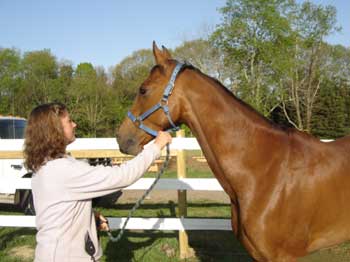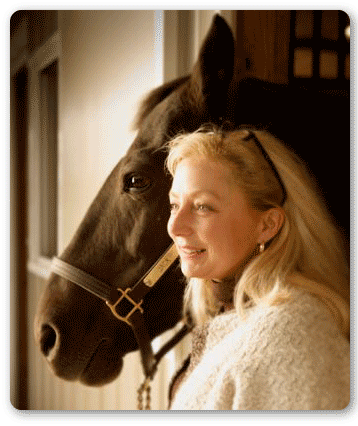Life After Boarding: Bringing Your Horse Home

If you have always boarded your horses, the opportunity to bring them home is one of life's greatest pleasures. It is truly wonderful to be able to walk out of your home and visit with your equine friends any time you want.
Preparation of living quarters and pasture is your first priority.
Stable accommodations can be a simple outdoor shed or a complete barn. Pasturing considerations are equally important. Deciding when, where, and for how long your horse is pastured is totally your choice. You'll also be the one to choose whether he should be pastured alone or with other horses.
As your horse's owner, you know his temperament.
If your horse is used to traveling, showing or trail riding, he may take the change completely in stride. But for many horses, a significant change in living arrangements can be pretty stressful. You horse will need your love and reassurance to make a smooth transition.
Here are some tips that can make your horse's homecoming a little easier:
Consider your hay and grain selection.
Will you be feeding your horse the same feed at home as he has become accustomed to in boarding? If not, purchase a limited quantity of his ''board'' fare so you can slowly introduce him to new feed. Mix hays and grains for a few days, gradually using less of the "board" feed and more of yours.
Remember, not all water will taste the same to your horse.
If the boarding facility's water source is different from home, the mineral content (iron, sulfur, etc.) may be substantially different, and your horse may not drink. Bring some water home from the boarding facility and again, gradually mix the two until he has become accustomed to his ''home'' water.
Is the trip home a lengthy one?
Make travel as comfortable and easy as possible. Hay nets with regular feed hay will help to make for a more pleasant and safer trailer ride. Make sure you plan for several watering stops along the way.
You will be excited to get home with your horse, and so will he.
Your horse will definitely pick up on your attitude, so focus on staying calm. This will help set the stage for an easier adjustment to a new environment.
It's always a good idea to show horses their pasture boundaries.
Walk the fence line with him. Let him look, sniff and evaluate his new surroundings. If your horse is very excitable, you may want to start him out in his new stall with fresh water and hay. If possible, position him so that he has a ''view'' from his stall, so he can visually get used to his new surroundings.
First time out in the pasture, you may want to use a lunge line (if your horse is familiar and comfortable with one).
Allow him to move in a tight circle at first, gradually offering more length so he ease outward. Move around the new pasture as you lunge. Do not try using this technique if your horse is not familiar with lunging. He may try to avoid the line and bolt out of fear.
Always end on a positive note.
Talk to your horse and praise good behavior. Keep him as calm as possible; turn out will be much easier. You may want to put out hay near the area where you will be retrieving him from turnout as a little extra ''motivation.''
Happy homecoming!
 Debbie has over 45 years experience with horses and equine-related businesses. She has owned, trained, boarded horses and run stables at various times in her career. She is a certified fence installer, has given balanced riding lessons, and has shown horses in Western, Western Pleasure, Trail, English, Hunter/Jumper, Fox Hunting, Hunter Trials, Dressage and driving classes. Debbie has been involved in foaling, and just about every aspect of horse ownership possible, and she welcomes your questions and comments. If you are interested in using any articles by Debbie, please send her an email.
Debbie has over 45 years experience with horses and equine-related businesses. She has owned, trained, boarded horses and run stables at various times in her career. She is a certified fence installer, has given balanced riding lessons, and has shown horses in Western, Western Pleasure, Trail, English, Hunter/Jumper, Fox Hunting, Hunter Trials, Dressage and driving classes. Debbie has been involved in foaling, and just about every aspect of horse ownership possible, and she welcomes your questions and comments. If you are interested in using any articles by Debbie, please send her an email.
